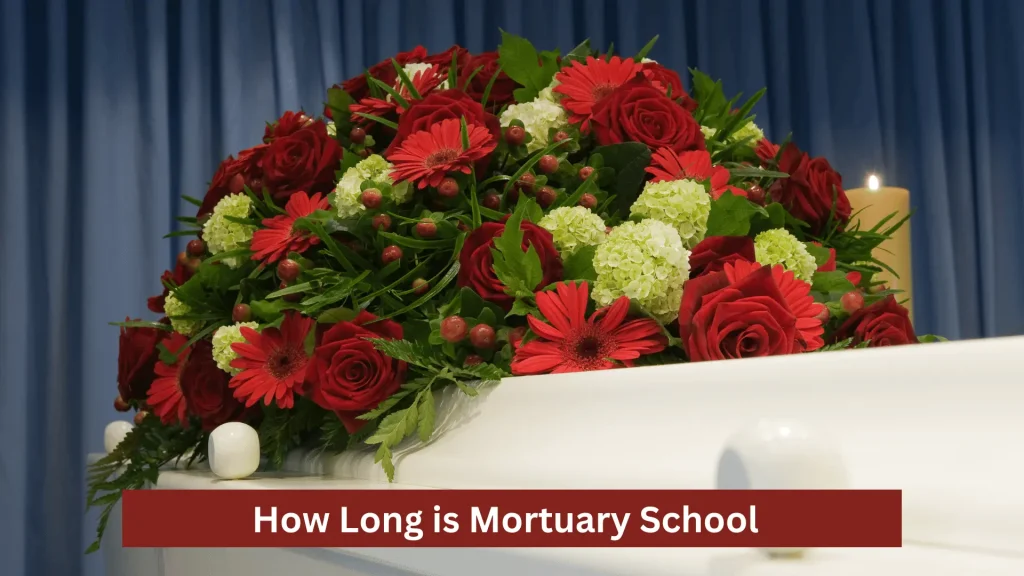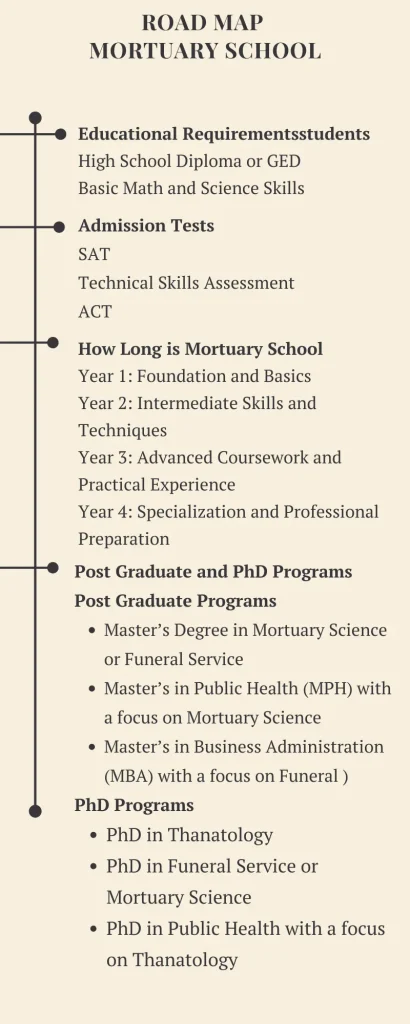How Long is Mortuary School
How long is mortuary school? Mortuary school typically takes about 2 to 4 years to complete. The duration depends on whether you pursue an associate’s degree or a bachelor’s degree. Both programs include coursework in embalming, funeral service management, and grief counseling, among other subjects.
What is Mortuary School?
Mortuary school is a specialized educational institution where students learn the skills and knowledge required to work in the funeral service industry. The curriculum covers a wide range of topics, including embalming, restorative art, funeral directing, and grief counseling. Students also gain practical experience through internships or apprenticeships, preparing them for state licensing exams and careers as funeral directors or embalmers.

In addition to technical skills, mortuary school emphasizes the importance of compassion and ethical practices in dealing with grieving families. Graduates are trained to handle all aspects of funeral service, from arranging and conducting funerals to managing a funeral home. The comprehensive education ensures that they are well-prepared to provide dignified and respectful services to the deceased and their loved ones.
How Long is Mortuary School
Year 1: Foundation and Basics
In the first year of an undergraduate mortuary school program, students typically focus on foundational courses. These include basic sciences like anatomy, chemistry, and microbiology. Students are introduced to funeral service principles, ethics, and the history of funeral service. Basic embalming techniques and restorative art may also be covered.
Year 2: Intermediate Skills and Techniques
The second year builds on the foundational knowledge, delving deeper into embalming and restorative art. Courses may include funeral service management, grief counseling, and communication skills. Students also start to learn about business practices specific to running a funeral home. Practical labs and workshops are more frequent, allowing students to practice their skills.
Year 3: Advanced Coursework and Practical Experience
In the third year, students engage in advanced embalming techniques, restorative art, and cosmetic applications. They study pathology, public health, and regulatory compliance. The curriculum often includes courses on managing a funeral service business, marketing, and advanced grief counseling. This year typically involves more hands-on experience and internships.
Year 4: Specialization and Professional Preparation
The final year is focused on preparing students for professional practice. This includes advanced coursework in areas such as forensic pathology, complex restorative art, and comprehensive funeral service management. Students complete internships or apprenticeships in funeral homes, gaining real-world experience. Preparation for state licensing exams and career placement services are integral parts of the fourth year.

Throughout the program, students also attend seminars, workshops, and possibly national conventions to stay updated on industry trends and network with professionals. The comprehensive education ensures that graduates are well-equipped to enter the funeral service industry with a strong skill set and professional demeanor.
How to Enter Mortuary School
Educational Requirements
High School Diploma or Equivalent: Applicants must have a high school diploma or GED.
Prerequisite Courses: Some programs may require completion of courses in biology, chemistry, and anatomy before admission.
Minimum GPA: A minimum GPA, often around 2.5, may be required for entry.
Entry Tests
Standardized Tests: Some programs might require SAT or ACT scores.
Placement Tests: Institutions may require placement tests in subjects like math and English if standardized test scores are not provided.
Application Process
Application Form: Complete the application form, which can typically be found on the institution’s website.
Transcripts: Submit official high school and any college transcripts.
Personal Statement: Write a personal statement or essay explaining your interest in mortuary science.
Letters of Recommendation: Provide letters of recommendation from teachers, employers, or professionals in the field.
Interview: Some schools may require an interview as part of the admission process.
Financial Aids
Federal Aid: Complete the Free Application for Federal Student Aid (FAFSA) to determine eligibility for federal grants, loans, and work-study programs.
Scholarships: Look for scholarships specific to mortuary science or funeral service education offered by schools, professional organizations, and community groups.
State Aid: Investigate state-specific financial aid programs that may provide grants or loans.
Payment Plans: Many schools offer payment plans to help spread out the cost of tuition over the semester or year.
Private Loans: Consider private loans through banks or credit unions if additional funding is needed.
By understanding these key points, prospective students can better navigate the process of applying to mortuary school and securing the necessary funding for their education.
Postgraduate and PhD Programs
Postgraduate Programs in Mortuary Science
Master’s Degree in Mortuary Science or Funeral Service:
Program Focus: Advanced study in funeral service management, grief counseling, advanced embalming techniques, and funeral service ethics.
Duration: Typically 1-2 years.
Career Opportunities: Higher-level roles in funeral home management, teaching positions, or specialized areas such as forensic mortuary science.
Master’s in Public Health (MPH) with a focus on Mortuary Science:
Program Focus: Combines public health with funeral service, emphasizing epidemiology, public health policies related to death and funerals, and health administration.
Duration: Generally 2 years.
Career Opportunities: Roles in public health organizations, policy development, or community health initiatives related to bereavement and funeral services.
Master’s in Business Administration (MBA) with a focus on Funeral Service Management:
Program Focus: Business management principles tailored to the funeral service industry, including finance, marketing, and human resources.
Duration: Usually 1-2 years.
Career Opportunities: Management or ownership of funeral homes, business consulting for the funeral service industry.
PhD Programs in Mortuary Science
PhD in Thanatology:
Program Focus: In-depth research and study of death, dying, and bereavement. Includes research methods, advanced grief counseling, and theoretical frameworks.
Duration: Typically 3-5 years.
Career Opportunities: Academic positions, research roles, advanced clinical practice in grief counseling, or policy development related to death and bereavement.
PhD in Funeral Service or Mortuary Science:
Program Focus: Advanced research in various aspects of funeral service, including embalming techniques, funeral service management, and the social aspects of death.
Duration: Generally 4-6 years.
Career Opportunities: University faculty positions, high-level consultancy roles, or leading research projects in funeral service practices.
PhD in Public Health with a focus on Thanatology:
Program Focus: Research on public health issues related to death and funerals, including the impact of funeral practices on community health.
Duration: Typically 4-6 years.
Career Opportunities: Research positions in public health organizations, teaching roles, or policy-making positions focused on end-of-life issues.
These advanced programs provide specialized knowledge and skills for careers in academia, high-level management, and research within the field of mortuary science and related areas.
Top 10 Mortuary Schools
Here are ten of the top mortuary schools in the United States known for their strong programs in mortuary science and funeral service education:

Cincinnati College of Mortuary Science (CCMS)
Location: Cincinnati, Ohio
Programs: Associate and Bachelor’s Degrees in Mortuary Science
National Institute of Funeral Service (NIFS)
Location: Houston, Texas
Programs: Associate Degree in Funeral Service
American Academy McAllister Institute of Funeral Service
Location: New York, New York
Programs: Associate Degree in Mortuary Science, Bachelor’s Degree in Funeral Service Management
Pittsburgh Institute of Mortuary Science (PIMS)
Location: Pittsburgh, Pennsylvania
Programs: Associate Degree in Mortuary Science
University of the Cumberlands
Location: Williamsburg, Kentucky
Programs: Bachelor’s Degree in Mortuary Science
Mortuary Science Program at San Francisco State University
Location: San Francisco, California
Programs: Bachelor’s Degree in Mortuary Science
University of Central Oklahoma (UCO)
Location: Edmond, Oklahoma
Programs: Bachelor’s Degree in Funeral Service
Oklahoma State University (OSU) Institute of Technology
Location: Okmulgee, Oklahoma
Programs: Associate Degree in Funeral Service
St. Louis Community College (SLCC)
Location: St. Louis, Missouri
Programs: Associate Degree in Mortuary Science
Wichita State University
Location: Wichita, Kansas
Programs: Bachelor’s Degree in Mortuary Science
These schools are recognized for their comprehensive programs, experienced faculty, and successful graduate outcomes in the field of mortuary science.
Factors Affecting the Length of Mortuary School
The length of mortuary school can vary depending on several factors:
Type of Degree Program:
Associate Degree: Typically takes 2 years to complete.
Bachelor’s Degree: Usually requires 4 years of study.
Master’s and Doctoral Programs: Advanced degrees can take an additional 1-2 years for a Master’s and 3-6 years for a PhD.
Full-Time vs. Part-Time Enrollment:
Full-Time: Generally allows students to complete their program in the standard timeframe.
Part-Time: May extend the length of the program due to a reduced course load.
Curriculum Structure:
Comprehensive Programs: Programs with extensive coursework and practical training may take longer to complete.
Accelerated Programs: Some schools offer accelerated options that can shorten the duration.
Prerequisite Requirements:
Required Coursework: Students may need to complete prerequisite courses in subjects like biology or chemistry before starting the core mortuary science curriculum.
Transfer Credits: Students transferring from other institutions might have different completion timelines based on credit transfer policies.
Internship and Practical Experience:
Internships: Some programs include mandatory internships or apprenticeships, which can affect the overall length of the program.
Hands-On Training: Extensive hands-on training or lab work may add to the duration.
State Licensing Requirements:
Exam Preparation: Time needed to prepare for and pass state licensing exams can impact the overall length of the educational process.
Additional Certifications: Some states require additional certifications or coursework.
School’s Schedule and Academic Calendar:
Semester vs. Quarter Systems: Schools operating on different academic calendars may have varying lengths for completing their programs.
Summer Sessions: Availability of summer courses can affect the duration.
Individual Student Factors:
Academic Performance: Students who need to retake courses or require additional support may experience delays.
Personal Commitments: Work or personal responsibilities can influence the pace at which a student completes their program.
Understanding these factors helps prospective students plan their education path and manage expectations regarding the time required to complete their mortuary science training.
Final Verdict
The length of mortuary school depends on various factors such as degree type, enrollment status, and curriculum structure. Understanding these aspects helps students plan effectively and navigate their educational journey in mortuary science, ensuring a smoother transition into their professional careers.
FAQs
1.How long does it take to complete an associate degree in mortuary science?
Typically 2 years for full-time students.
2.What is the difference between an associate and a bachelor’s degree in mortuary science?
An associate degree generally takes 2 years, while a bachelor’s degree requires 4 years.
3.Do I need to complete any prerequisites before starting mortuary school?
Yes, some programs require courses in biology, chemistry, or anatomy before admission.
4.How does part-time enrollment affect the length of the program?
Part-time enrollment usually extends the program duration compared to full-time study.
5.Are internships mandatory in mortuary science programs?
Many programs include mandatory internships or apprenticeships as part of the curriculum.
